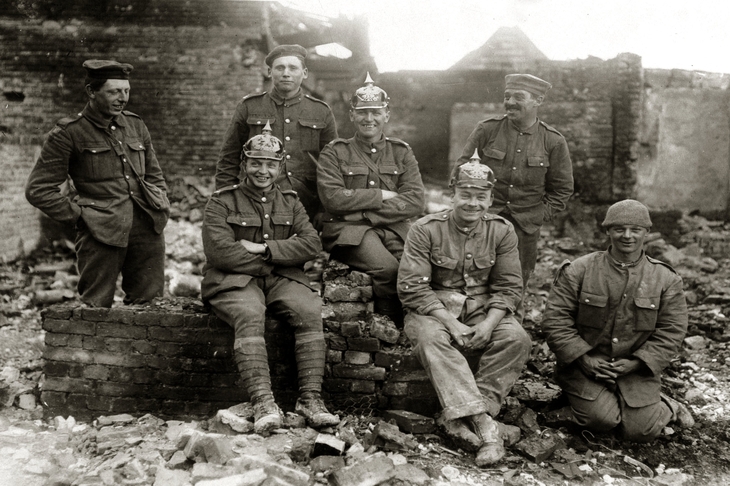Last week I was in the Somme, visiting the first world war battlefields before the great and the good descend on the region this week to mark the centenary of the Armistice.
In one cemetery I found propped against the headstone of Captain Frank Morkill a plastic folder, left two months earlier by a relative. Inside was a facsimile of his last letter home, written three days before he was killed in action on September 15 1916. ‘I can truly say without any mock heroism that I am only too thankful to have seen the dawn of Germany’s downfall,’ wrote Morkill, a Canadian, who had been wounded twice in previous fighting. ‘Also, that on the anniversary of my first year of war I am here to help in that overthrow, and here with several of my best friends.’
Such buoyant letters from the trenches were the norm during the war, a fact that surprised the Duchess of Cambridge last week during a visit to the Imperial War Museum. Shown letters written from the front from three of her great-great-uncles, all of whom were subsequently killed, she commented: ‘What really struck me was the positivity, they are writing home with such positivity. It is a side you don’t really see reflected.’
Her Royal Highness is right; it is rare in this day and age to hear the authentic voice of the first world war Tommy. Thanks to the left’s cultural appropriation of the conflict, what we have been force fed for decades is the idea that the men who volunteered in 1914 were all hapless victims of a cold-hearted Empire. The 14-18 Now Centenary Art Commission is a case in point. Government-funded to the tune of £50m, the Commission’s website boasts that its 325 artworks open up ‘new perspectives’ on the war. Among the perspectives are ‘Dawn’, a play about three soldiers convicted of mutiny and desertion; ‘Furious Folly’, a sound and light show that rails against ‘the madness of the battlefield and the futility of WW1’, and ‘Bloodyminded’, an interactive feature film about conscientious objectors and the morality of war.
The Commission’s latest initiative is Danny Boyle’s ‘The Pages of the Sea’, in which portraits of soldiers will be etched into the sand of British beaches on Sunday. Wilfred Owen will adorn Folkestone beach, explains Boyle, because ‘he, and the other poets, brought the war home in a way that the newspapers and newsreels could not’. That is simply not true. Ivor Gurney, Siegfried Sassoon and Wilfred Owen didn’t publish their first poems until the penultimate year of the war and outside London literary circles they were virtually unknown. According to Owen’s biographer, Dominic Hibberd, he continued to be regarded ‘as a fairly minor poet’ until the 1960s when he became the voice of students protesting the Vietnam War.
If the Commission had wanted a genuinely fresh and edgy perspective on the conflict, it could have honoured the courage and resilience of our armed forces in winning a brutal war, perhaps featuring some of the 627 men who were awarded the Victoria Cross, as opposed to remembering the 306 who were shot at dawn, many for murder, mutiny and desertion.
But that would have meant confronting an unpalatable truth: that a great many men enjoyed the war. That’s not to diminish the dread they experienced during battle, or the misery of life in a frontline trench, but these were hard men who had led tough civilian lives and while combat was terrifying it was also exhilarating.
For many Tommies the war was a step-up in life. Raised in poverty, enlisting in the army gave them a regular wage, medical care and a sense of identity in a hitherto deprived existence. Within months they were on troopships heading to faraway places with exotic names and even more exotic young ladies. They were happy.
The film director, Peter Jackson, recently made this point when discussing his new film, They Shall Not Grow Old, for which he colourised original footage of the conflict. ‘It was their lack of self-pity that surprised me,’ admitted Jackson. ‘We think that we sent these men into this industrial grinding machine. But they certainly didn’t think that was what was happening to them – there was no feeling sorry for themselves.’
Charles Carrington fought in some of the bloodiest battles of the war and in the preface to his memoir, he wrote: ‘Like so many young men [I] enjoyed being a soldier on the whole…most of the war books, which attained such popularity ten or twelve years later were written by non-combatants who observed war externally from behind.’
Far from being blinded by jingoist naivety, Carrington and his comrades ‘welcomed danger and we expected the worst… rightly or wrongly, wisely or foolishly, we did these things with our eyes open.’
Carrington’s book appeared in 1929, the same year Frederic Manning published Her Privates We, a novel which drew on his experience in the trenches. One of the first books written from the ranks, it shocked its readers with its gritty realism, portraying the average Tommy as brave, brutal, libidinous and sardonic. There was, wrote Manning of an attack on a German trench, ‘some strange intoxication of joy in it… the extremities of pain and pleasure had met and coincided.’
In 1964 the BBC broadcast its brilliant 26-part series, The Great War, in which veterans recalled without rancour or self-pity their experience of gas attacks, bayonet charges, artillery barrages and the death of their pals.
But as the number of veterans dwindled, so the cultural appropriation of the conflict quickened, and films such as Oh! What A Lovely War, Gallipoli, The Monocled Mutineer, Regeneration and comedies like Blackadder Goes Forth reinforced the spurious narrative of a war of ‘Lions led by Donkeys’.
The perspectives of Boyle and the 14-18 Now Centenary Art Commission are those of modern artists whose only affinity with their subjects is nationality. Culturally, morally and temperamentally, the Briton of 2018 bears no resemblance to the one of 1918, and the Commission’s artists are guilty of seeing the war through the lens of 21st century victimhood with their minds closed to the idea that many young men found a fulfilment in war, in spite of the ordeal of battle.
In judging the first world war by today’s values we are guilty of what the historian E. P. Thomson in his book, The Making of the English Working Class, called the ‘enormous condescension of posterity’ whereby history is rewritten to suit contemporary middle-class mores. By all means let us commemorate the fallen but let us also be proud of the bravery, loyalty, belligerence and sheer bloody-mindedness of our Tommies; they didn’t see themselves as idealistic victims but as obdurate victors.







Comments